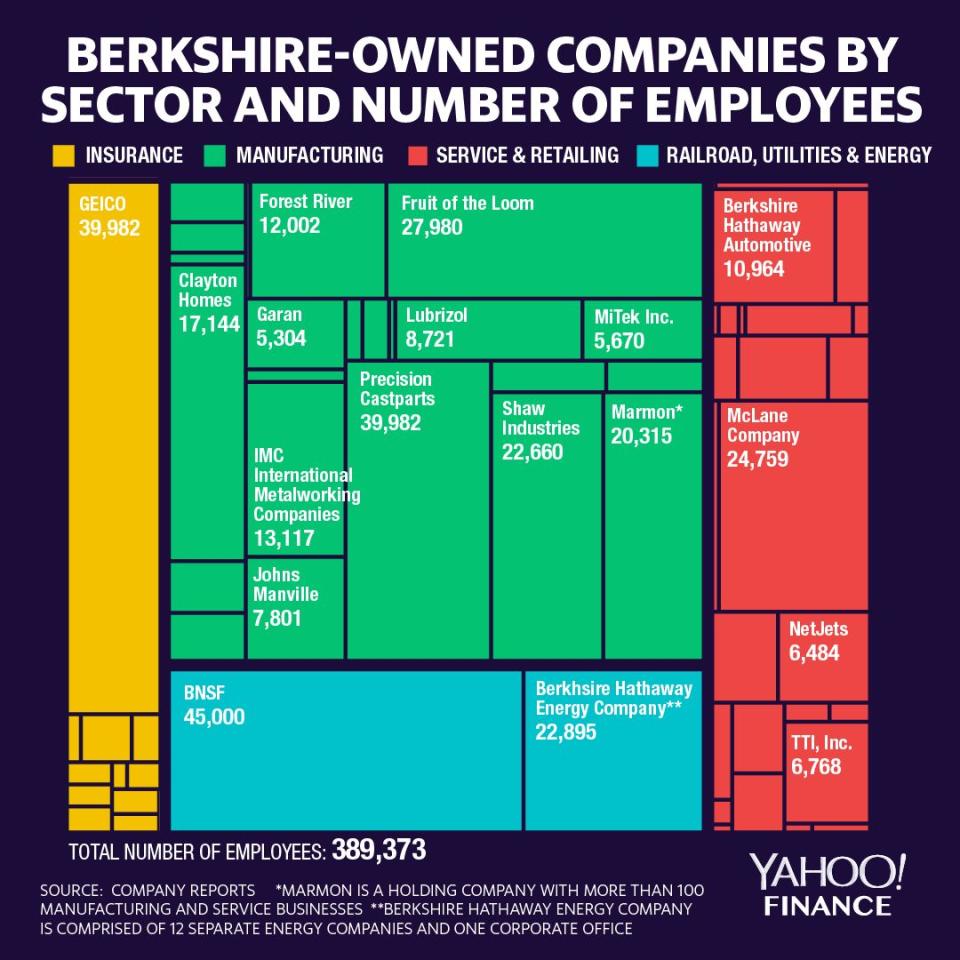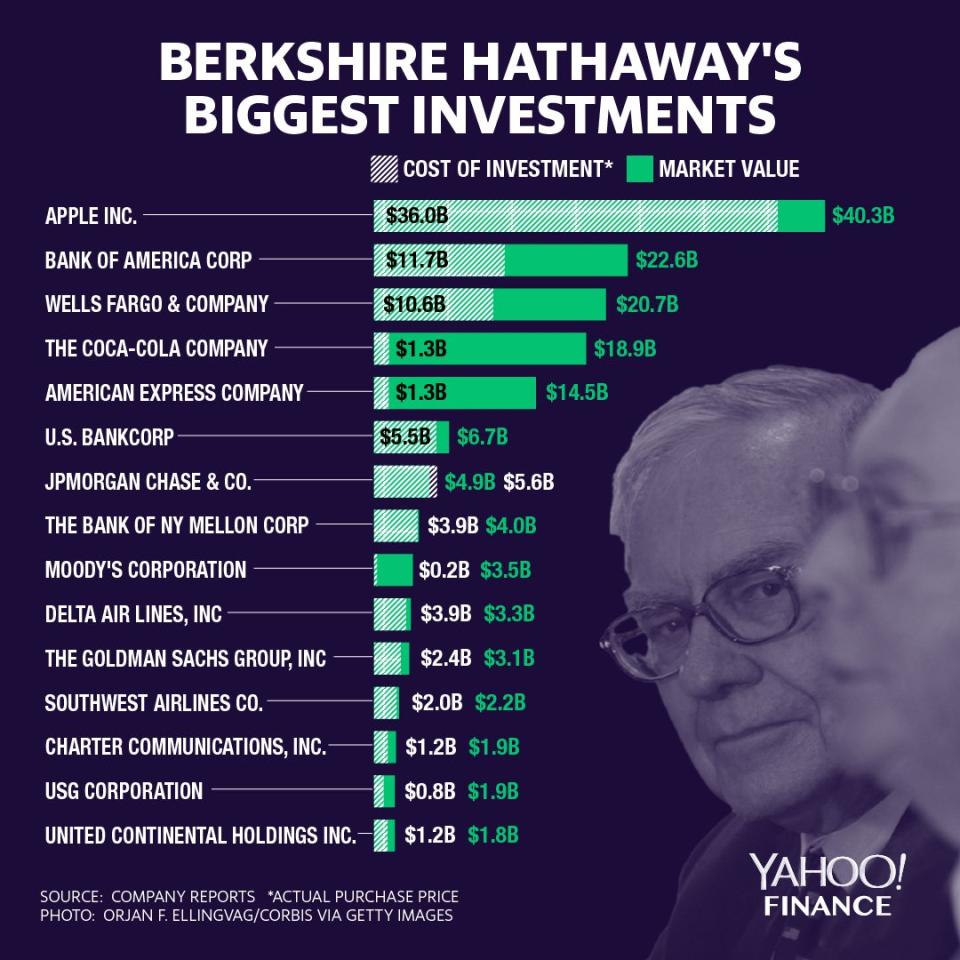Berkshire Hathaway Q1 earnings grow, but Kraft Heinz is missing
Berkshire Hathaway (BRK-A, BRK-B) reported Q1 results that appear to be a bit stronger than what was expected by analysts.
Q1 operating earnings increased to $5.55 billion from $5.29 billion a year ago. This was higher than the $5.29 billion expected by analysts. (Note, operating earnings do not include quarterly gains or losses from Berkshire’s investments and derivatives portfolios.)
It’s very important to note that Berkshire’s results do not include the impact of Kraft Heinz’s (KHC) recent woes. In February, the packaged food company reported weak earnings and gave weak guidance; disclosed a massive $15.4 billion non-cash impairment charge mostly tied to Kraft and Oscar Mayer brands; revealed it received an SEC subpoena related to its accounting practices; and announced a dividend cut. Share crashed on the news.
[Click here for coverage of the 2019 Berkshire Hathaway Shareholders Meeting.]
“As of May 3, 2019, Kraft Heinz has not filed its 2018 Form 10-K with the Securities and Exchange Commission. In addition, Kraft Heinz has not made its financial statements for the first quarter of 2019 available to Berkshire. Accordingly, Berkshire does not have the necessary financial information to determine its share of the earnings of Kraft Heinz for the first quarter of 2019. As a result, Berkshire’s first quarter 2019 other operating earnings excludes such amount.”
On Saturday, Berkshire CEO Warren Buffett told reporters that it’s “pretty unusual” for a company to not have filed its 10-K yet.

Berkshire owns around 27% of the company. Management says they’ll take Kraft Heinz into account as soon as they make available their financial results.
“Other operating earnings in the first quarter of 2018 included $234 million related to Berkshire’s investment in Kraft Heinz,” they noted.
The news comes hours before the 2019 Berkshire Hathaway Shareholders Meeting.
Berkshire’s cash hoard grows
As earnings grew, so did Berkshire’s pile of cash and cash equivalents. As of the end of Q1, the company was sitting on $114.2 billion, up from $111.9 billion at the end of Q4.
And as attractive M&A targets remain elusive, Berkshire bought back its own shares. During the first quarter, Berkshire repurchased $1.7 billion worth of class A and B shares.
“In the years ahead, we hope to move much of our excess liquidity into businesses that Berkshire will permanently own,” Buffett said in his 2018 letter to shareholders. “The immediate prospects for that, however, are not good: Prices are sky-high for businesses possessing decent long-term prospects.”
The “meaningless” and “misleading” part of Berkshire’s results
Net earnings, which has become very volatile due to an accounting rule change, came in at $21.7 billion or $13,209 per A share and $8.81 per B share. This compared to a $1.1 billion loss a year ago. During the period, Berkshire benefited from a $15.1 billion unrealized gain on its stock portfolio.
“The amount of investment gains/losses in any given quarter is usually meaningless and delivers figures for net earnings per share that can be extremely misleading to investors who have little or no knowledge of accounting rules,” Berkshire management noted. Emphasis theirs.

As mentioned above, Berkshire Hathaway’s bottom line has become a lot more volatile lately, not because its business model changed. Rather, it’s because of accounting.
A recent change to generally accepted accounting principles (GAAP) by the Financial Accounting Standards Board (FASB) requires companies to account for short-term swings of their equity investments in their quarterly earnings. These are known as unrealized gains and losses— unrealized because these are paper losses, not actual losses (or realized gains and losses) that come from the sales of these securities.
“That requirement will produce some truly wild and capricious swings in our GAAP bottom-line,” Buffett said in his 2017 letter to shareholders. “Berkshire owns $170 billion of marketable stocks (not including our shares of Kraft Heinz), and the value of these holdings can easily swing by $10 billion or more within a quarterly reporting period. Including gyrations of that magnitude in reported net income will swamp the truly important numbers that describe our operating performance. For analytical purposes, Berkshire’s ‘bottom-line’ will be useless.”
“[N]either Berkshire’s Vice Chairman, Charlie Munger, nor I believe that rule to be sensible,” Buffett wrote on the first page of his 2018 letter to shareholders. “Rather, both of us have consistently thought that at Berkshire this mark-to-market change would produce what I described as ‘wild and capricious swings in our bottom line.’”
So what are investors to do when they peruse the quarterly income statement of a company holding a lot of equity investments?
“Our advice? Focus on operating earnings, paying little attention to gains or losses of any variety.”
—
Sam Ro is managing editor at Yahoo Finance. Follow him on Twitter: @SamRo
Read more:
Warren Buffett explains why he thinks going to college isn't for everybody
Warren Buffett's definition of 'true success' has nothing to do with money
Warren Buffett identifies the 'best way' to address income inequality
Follow Yahoo Finance on Twitter, Facebook, Instagram, Flipboard, SmartNews, LinkedIn, YouTube, and reddit.
